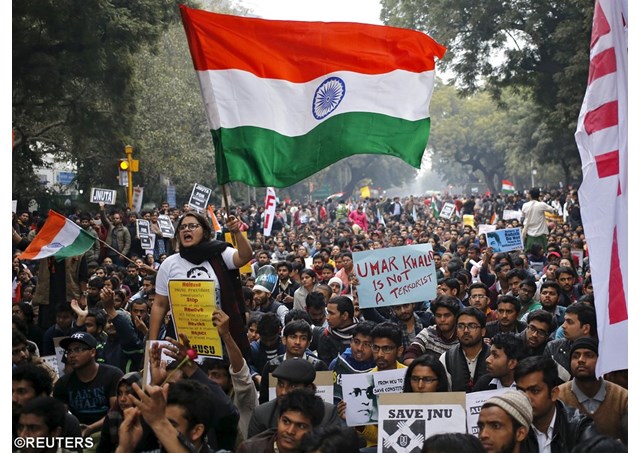
India's church leaders criticize order to fly flag at universities

Indian church leaders have criticized the federal government's decision to require India's flag be displayed at universities to instill a sense of nationalism among students, saying the government misunderstands the issue. The federal ministry of human resource and development Feb. 18 asked the vice chancellors of 39 central universities to "prominently and proudly" display the flag at their respective campuses. The decision has come amid the backdrop of alleged anti-India slogans raised by students at Jawaharlal Nehru University (JNU) in New Delhi, forcing the government to press sedition charges against those accused.
"Putting a flag on a university is just a superficial arrangement by the government. Indians do not need a certificate from anyone about being nationalist," said Samuel Jayakumar, secretary of the Commission on policy, governance and public witness of the Delhi-based National Council of Churches in India. He told UCANEWS that the order shows that there is no space for people to speak in this country. Father Savari Muthu, spokesman for the Catholic Archdiocese of Delhi told UCANEWS "A person is not a nationalist only if he has a flag on the top of his house. The government's way of prescribing one kind of nationalism is not good for the nation," he said.
The order to fly the national flag comes in the wake of a protest that rocked JNU this week and spread across India on Thursday, with students and teachers in at least 10 cities demanding the release of a student leader arrested on sedition charges and accused of being anti-Indian. The protesters were outraged by nationally televised scenes of Kanhaiya Kumar, the student union president at Jawaharlal Nehru University, being kicked and punched while he was escorted to a court hearing Wednesday, renewing allegations that the Hindu nationalist governing party is intolerant. He was arrested Feb. 12 over his participation in events where anti-India slogans were allegedly shouted. A New Delhi court has ordered him to stay in custody for two weeks. India's Supreme Court on Friday refused his bail plea, saying it was under the purview of a lower court.
The demands for the student's release in the Indian capital were met by mobs of Hindu nationalists, including many lawyers, attacking students and accusing them of being anti-Indian. Prime Minister Narendra Modi's Bharatiya Janata Party and other Hindu groups accuse left-wing student groups of anti-nationalism because of their criticism of the 2013 execution of a Kashmiri separatist convicted of an attack on Parliament.
Kumar's treatment and attacks on teachers who supported him have triggered allegations that the Modi government and the BJP are cracking down on political dissent in the name of patriotism. Soon after the protests began, India's Home Minister Rajnath Singh tweeted that anyone shouting anti-India slogans ``will not be tolerated or spared.'' The violence by lawyers occurred despite the Supreme Court ordering the police to ensure security in the court and has drawn wide criticism of the lawyers and police. On Thursday, students in at least 10 Indian cities marched through the streets and denounced Kumar's arrest.
| All the contents on this site are copyrighted ©. |


